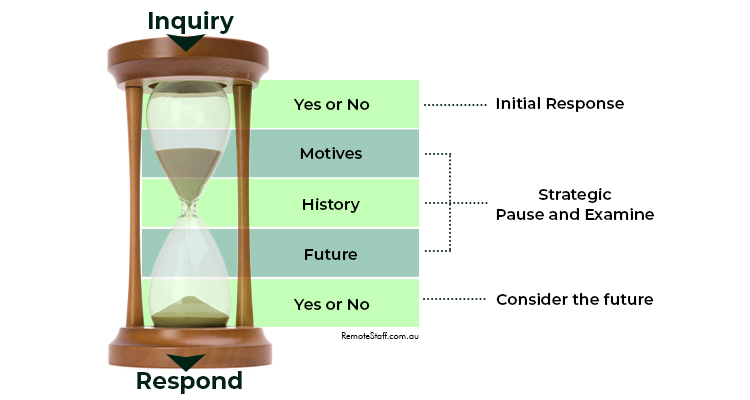Business leaders have to be decisive. You need to know how to ask for what you want- and express what you don’t want. In no uncertain terms
While the latter may be difficult, it’s highly necessary.
Saying no saves you time, energy, and focus. More importantly, it helps build respect and establishes boundaries between you and your team members – if you know how to do it properly.
The Hourglass Method

Most of the time, NO has a negative connotation. Hence, leaders tend to shy away from it as much (and for as long) as possible.
This is where the Hourglass Method comes in.
Simply put, it’s an approach that enables you to funnel decisions so you can take a strategic pause before you respond.
For instance, when you receive an important email that requires a tough decision, you can use the Hourglass Method via the following steps:
- Begin by noting your initial response. Were you about to say yes or no? Whichever it was, write it down first.
- Pause and examine your motives and history. Are you really enthusiastic about the opportunity? Or do you just want to please others?
- Write down your thoughts, whether they’re positive or negative. The point is to jot down what you think about your personal motives.
- Think about past similar experiences where you said yes or no. Did you regret saying yes too often? Conversely, recall the times you said no and regretted it.
- Consider the future. How will your decision affect your team for the next few days, weeks, months, or longer? More importantly, will the outcome protect your time and focus?
With all these considerations, you’ll be ready with a highly deliberate decision- whether it’s a yes or no.
Different (and Effective Ways) of Saying No
Now that we’ve got the Hourglass Method locked in, let’s look at other ways in which you can say NO without guilt.
“May I get back to you tomorrow?”

Some questions are really difficult regardless of how well you apply the Hourglass Method. In case this happens, you can always buy yourself time to work it out.
Ask for some time if you don’t feel like you have the capacity to decide on the spot. Once the pressure is off, you’ll be better equipped to make a rational decision.
“I can do it now, but I can’t do it every time.”

You can manage a demanding person’s expectations by saying “no” to future requests with this response. Help them now, but don’t let them off expecting that you’ll do it again next time.
This is especially effective for employees who always run to you for the same problem over and over again.
“It does not work for me.”

If you want to say no politely, this phrase works wonders. It’s a marvelous and neutral sentence that helps express your point without being harsh.
Of course, mind your tone and expression when you say this. Remember, it’s not what you say but how you say it that matters.
“I can’t, but here’s another option.”

Rather than completely saying no, you can also share an alternative solution.
While you may not be able to grant a request or assistance, it would be better if you can share suggestions instead. This way, your employees and team members will still feel valued and listened to.
“Sorry, no.”

This is a complete sentence.
If you don’t have anything else to say, just spit it out. Some situations just don’t require an explanation or justification.
When you’re sure about your decision and have all the reasons to decline, just say no outright. That’s more than enough.
Remote Staff has been assisting Aussie SMEs and entrepreneurs like you since 2007 with the help of our skilled remote workers from the Philippines. Aside from finding and hiring the best talents, we also help with onboarding so you can say yes to the more important things.
Call us today or schedule a call back and let’s get started.
Serena has been working remotely and writing content for the better part of the last decade. To date, she's written for Pepper.ph and Mabuhay Magazine, among others, and has churned out more than a thousand articles on everything from The Basics of Stock Market Investing to How to Make Milk Tea-Flavored Taho at home.
- Serena Estrella
- Serena Estrella
- Serena Estrella
- Serena Estrella
- Serena Estrella
- Serena Estrella
- Serena Estrella
- Serena Estrella
- Serena Estrella
- Serena Estrella
- Serena Estrella
- Serena Estrella
- Serena Estrella
- Serena Estrella
- Serena Estrella
- Serena Estrella
- Serena Estrella
- Serena Estrella
- Serena Estrella
- Serena Estrella
- Serena Estrella
- Serena Estrella
- Serena Estrella
- Serena Estrella
- Serena Estrella
- Serena Estrella
- Serena Estrella
- Serena Estrella
- Serena Estrella
- Serena Estrella
- Serena Estrella
- Serena Estrella
- Serena Estrella
- Serena Estrella
- Serena Estrella
- Serena Estrella
- Serena Estrella
- Serena Estrella
- Serena Estrella
- Serena Estrella
- Serena Estrella
- Serena Estrella
- Serena Estrella
- Serena Estrella
- Serena Estrella
- Serena Estrella
- Serena Estrella
- Serena Estrella
- Serena Estrella
- Serena Estrella
- Serena Estrella
- Serena Estrella
- Serena Estrella
- Serena Estrella
- Serena Estrella
- Serena Estrella
- Serena Estrella
- Serena Estrella
- Serena Estrella
- Serena Estrella
- Serena Estrella
- Serena Estrella
- Serena Estrella
- Serena Estrella
- Serena Estrella
- Serena Estrella
- Serena Estrella
- Serena Estrella
- Serena Estrella
- Serena Estrella
- Serena Estrella
- Serena Estrella
- Serena Estrella
- Serena Estrella
- Serena Estrella
- Serena Estrella
- Serena Estrella
- Serena Estrella
- Serena Estrella
- Serena Estrella
- Serena Estrella
- Serena Estrella
- Serena Estrella
- Serena Estrella
- Serena Estrella
- Serena Estrella
- Serena Estrella
- Serena Estrella
- Serena Estrella
- Serena Estrella
- Serena Estrella
- Serena Estrella
- Serena Estrella
- Serena Estrella
- Serena Estrella
- Serena Estrella
- Serena Estrella
- Serena Estrella
- Serena Estrella
- Serena Estrella
- Serena Estrella
- Serena Estrella
- Serena Estrella
- Serena Estrella
- Serena Estrella
- Serena Estrella
- Serena Estrella
- Serena Estrella
- Serena Estrella
- Serena Estrella
- Serena Estrella
- Serena Estrella
- Serena Estrella
- Serena Estrella
- Serena Estrella
- Serena Estrella
- Serena Estrella
- Serena Estrella
- Serena Estrella
- Serena Estrella
- Serena Estrella
- Serena Estrella
- Serena Estrella
- Serena Estrella
- Serena Estrella
- Serena Estrella
- Serena Estrella
- Serena Estrella
- Serena Estrella
- Serena Estrella
- Serena Estrella
- Serena Estrella
- Serena Estrella
- Serena Estrella
- Serena Estrella
- Serena Estrella
- Serena Estrella
- Serena Estrella
- Serena Estrella
- Serena Estrella
- Serena Estrella
- Serena Estrella
- Serena Estrella
- Serena Estrella
- Serena Estrella
- Serena Estrella
- Serena Estrella
- Serena Estrella
- Serena Estrella
- Serena Estrella
- Serena Estrella
- Serena Estrella
- Serena Estrella
- Serena Estrella
- Serena Estrella
- Serena Estrella
- Serena Estrella
- Serena Estrella
- Serena Estrella
- Serena Estrella
- Serena Estrella





















